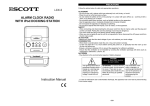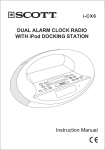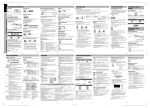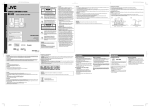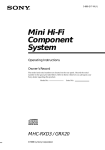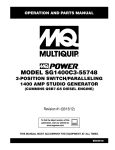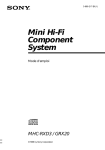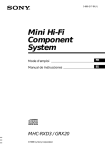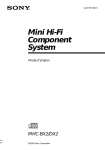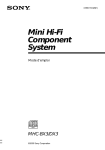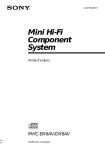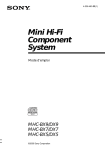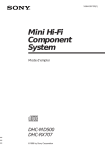Download JVC GVT0277-017B User's Manual
Transcript
ENGLISH GVT0277-017B EN_NX-D2[J] Operating Guide 02 Enjoying Movies/Music from your iPod Listening to a Disc/USB Device Compatible iPod Models To connect an iPod Connect an iPod to dock A or B on the unit. You can have 2 iPod devices connected at the same time. Video iPod model Audio Composite INSTRUCTIONS—Operating Guide GVT0277-017B EN_NX-D2[J] Operating Guide 02 Tag information iPod nano 1GB/2GB/4GB ✓ — ✓ iPod nano (2nd generation) 2GB/4GB/8GB ✓ — ✓ iPod nano (3rd generation) 4GB/8GB ✓ iPod nano (4th Generation) 8GB/16GB ✓ ✓ ✓ iPod mini 4GB ✓ — — iPod mini (2nd Generation) 4GB/6GB ✓ — — iPod with color display 20GB/60GB ✓ — — iPod (Click Wheel) 20GB/40GB ✓ — — iPod classic 80GB/120GB/160GB ✓ ✓ ✓ iPod photo 30GB/40GB/60GB ✓ ✓*1 — iPod (5th Generation) 30GB/60GB/80GB ✓ ✓ ✓ iPod touch 8GB/16GB/32GB ✓ ✓ ✓ iPod touch (2nd Generation) 8GB/16GB/32GB ✓ ✓*2 ✓ ✓ To detatch the dock adapter from the dock: Pull up the dock adapter with your fingernail or sharp pointed tool using the slot. To insert a disc ✓ Dock A Dock B Program Play/Random Play • Program Play/Random Play cannot be used for USB. Ex: To start / To pause • Be careful not to injure your fingertips or damage the terminal of the dock. About charging the battery of iPod The unit enables users to charge the battery of iPod. 1 Press to turn on the power of the unit. 2 Select iPod as the source. 3 Press and hold 7 for 2 seconds to start charging. • Press and hold 7 to deactivate the battery charging fuction. • When 2 iPod devices are connected, both batteries are charged at the same time. • For details of the battery charging, see the instruction manual for iPod. Playing Back Canceled Canceled To exit Program Play or Random Play, press PROGRAM or RANDOM until PRGM, RND are all off before or after playback. To stop • When using an 8 cm disc, place it on the inner circle of the disc tray. To close the disc tray, press 0 again. PROGRAM—To program the playing order. • You can arrange the playing order of the tracks/files (up to 99) before you start playback. • Resume does not work for Program Play. 1 Press PROGRAM button. 2 Select tracks/files you want for Program Play using the number buttons. • For MP3/WMA files: Select a group number, then select a track/file number. 3 Repeat step 2 until you complete your program. 4 Press 6 to start playback. To prohibit disc ejection (Child Lock) When the System is turned on and the disc tray is closed, press 0 while touching 7 (on the main unit). To cancel the prohibition, repeat the same procedure. “UNLOCKED” appears on the display. To connect a USB device USB cable (not supplied) Resume Play The System can store the stop point, and when you start playback again by pressing CD 6 or USB 6 (even while on standby), it starts from the position where you have stopped—Resume Play. To stop completely while Resume is activated, press 7 twice. To select a group While playing... Unique File Operations The operations will vary depending on the discs or files. To select the audio track Or press number buttons to select the audio track. You can select the audio channel to listen to. Display Message NO DEVICE, NO USB • No USB device is connected or the connected USB device is not compatible with this System. DEVICE ERR • The unit has failed to read the USB device. CAN’T PLAY • Playable format file does not exist in USB device. RANDOM—To play all the tracks at random. Playing Repeatedly Press REPEAT repeatedly to select Repeat Mode. Dock adapter (supplied with the iPod or sold separately) • Make sure the unit is on standby when you connect the iPod. • When you connect iPod to the dock, make sure the terminal on the dock is fully inserted into iPod. • After connecting iPod, wait until the unit is ready for operation (about 3 seconds). • Be careful not to damage the terminal on the dock when connecting / disconnecting the iPod. • Do not touch or hit the terminals of the dock and of iPod. It might cause damage to these terminals. • Always set the volume to the minimum level when connecting or disconnecting iPod. • Do not carry the unit with iPod connected. You might drop it down or it might cause damage to the connector part. • Remove iPod from the dock when you do not use it. *1 Only for still picture. *2 To view a video/picture from iPod touch on your TV, update the software to the latest version. (Any additional charges may apply.) For details about updating iPod, check on the Apple web site <http://www.apple.com>. • Repeat Mode varies depending on the medias or the files. Repeats the current track/file. REPEAT TRK Repeats all the contents of tracks/files. REPEAT ALL Repeats the current group. REPEAT GRP Canceled. REPEAT OFF To select a track/file While playing... (PROGRAM mode) REPEAT STEP Repeats the current track/file. Repeats all the programmed tracks/files. REPEAT ALL Canceled. REPEAT OFF • When you press 4 for the first time, you go back to the beginning of the current track/file. To locate a particular position While playing... (Press and hold) To locate an item directly To select a group: Press a group number using the number buttons. NX-D2 To select a track/file: Press a track/file number using the number buttons. GVT0277-017B 9 11 Listening to the Radio Playing Back iPod Devices Repeat play back • Before viewing a video/picture from iPod on your TV, make the appropriate video setting on iPod. For details of the setting, see the instruction manual for iPod. • For iPod touch Operate iPod touch itself in the following cases: –when operating the home button –when selecting application icons on the home screen –when dragging the slider • When you cannot operate iPod connected through the unit or using the remote control, operate iPod itself. Press REPEAT to change the repeat playback settings. Press once for track repeat, twice for repeat all, and once more to cancel. The System displays “REPEAT” only (the icon on the iPod display changes). • Refer to the instruction manual for the iPod for details. Shuffle Play Applies Shuffle Play to iPod A or iPod B selected as the source. Select the desired shuffle mode. • The shuffle icon lights up on the display of iPod devices. • To cancel, press again until the shuffle icon disappears. To go back to the previous menu A B Shuffle This function enables two iPod devices to play in shuffle mode alternately. You can play a variety of songs from both iPod devices. When the track of the current iPod source finishes, a track from the other iPod source will be played automatically and this cycle repeats. • Compatible iPod models are the same as those compatible with Tag information. Refer to “Compatible iPod Models” on page 9. • The iPod indicator (refer to “Display Indicators” in “Starting up”) on the unit is displayed and the current iPod source icon blinks while playing. To select an item on the menu 3 To stop A B Shuffle, press the SHUFFLE button again. The unit displays “A ← − → B OFF” and will stop playing the track. To forward or reverse skip • Removing one of the iPod devices from the dock will also stop A B Shuffle. • If this function does not work correctly, reconnect the iPod devices regardless of whether “CONNECTED” is displayed on the unit. While playing… • To confirm an item on the menu, press “SET.” To fast-forward or fast-reverse the track While playing… 2 sec. To connect an audio player Setting the Clock You can listen to the audio player connected to the AUDIO IN jack. Frequency starts changing on the display. When a station (frequency) with sufficient signal strength is tuned in, the frequency stops changing. • When you repeatedly press the button, the frequency changes step by step. To manually stop the search, press either button. • The ST indicator lights while an FM stereo station with sufficient signal strength is tuned in. If the FM reception is poor The MONO (monaural) indicator lights on the display. Reception will improve though stereo effect is lost— Monaural reception. To restore the stereo effect, press the button again. The MONO (monaural) indicator disappears. Presetting the Stations Setting the Daily Timer Without setting the built-in clock, you cannot use Daily Timer. 1 Press CLOCK/TIMER. Stereo mini plug (not supplied) 1 Connect iPod to docks A and B on the unit. 2 With both iPod devices connected, press the SHUFFLE button twice. The unit displays “A ← − → B ON” and will start playing a track. To start / To pause Tuning in to a Station While FM or AM is selected... Timer Operations Listening to an External Device • If you have already adjusted the clock before, press the button repeatedly until the clock setting mode is selected (see below). From audio output (or headphone out, etc.) Repeat the procedure for the following settings until finished. 2 Adjust the hour, then the minute using the cursor buttons, press SET. • To exit the clock settings, press CLOCK/TIMER as required. • To return to the previous step, press CANCEL. • Make sure to turn down the volume on the System to minimum level before starting playback. To adjust the audio input level If the sound from the device connected to the AUDIO IN jack is too loud or too quiet, you can preset the audio input level through the AUDIO IN jack (without changing the volume level). Daily Timer DAILY1 = ON (Time) While “AUDIO IN” is selected as the source... Daily Timer DAILY2 = ON (Time) Daily Timer DAILY3 = ON (Time) • As the number of the level increases, the preset input level is increased. Clock setting You can preset 30 FM and 15 AM stations. 1 Tune in to a station you want to preset. (Press and hold) 1 Select DAILY (1 – 3) time setting mode (ON) 2 Set the timer as you like. • You can also store the monaural reception mode for FM preset stations if it has been selected. Canceled 2 Press SET to activate the preset number entry mode. 1 Set the hour then the minute for on-time. 2 Set the hour then the minute for off-time. 3 Select the playback source—“TUNER AM,” “DISC,” “USB,” “iPod A,” “iPod B,” “AUDIO IN” or “TUNER FM.” 4 For “TUNER AM” or “TUNER FM”: Select a preset channel. For “DISC”: Select the group number, then the track/ file number*. For “USB”: Select the group number, then the track/ file number*. * You can select up to 99 groups and 150 tracks/files. 5 Select the volume level (“MIN” to “MAX” and “– –”). If you select “– –,” the volume is set to the same level as when the System was last turned off. Once settings are completed, the timer setting information appears in sequence. 3 Turn off the System (on standby), if you have set the timer with the System turned on. To cancel the Daily Timer, select DAILY (1 – 3) you want to cancel, then press CANCEL. To turn on the Daily Timer, select DAILY (1 – 3) you want to turn on, then press ENTER/SET. • Finish the following process while the indication on the display is flashing. 3 Select a preset number for the station you store using the number buttons. 4 Press SET to store the station. To tune in to a preset station 1 Select the band (FM or AM). 2 Select the preset number using the number buttons. To back up a preset station Press to go back to the standby mode. This memorizes the preset station you set. 10 GVT0277-017B EN_NX-D2[J] Operating Guide 02 Canceled 12 GVT0277-017B EN_NX-D2[J] Operating Guide 02 GVT0277-017B EN_NX-D2[J] Operating Guide 02 GVT0277-017B EN_NX-D2[J] Operating Guide 02 Sound Adjustments Enjoying Karaoke Adjusting the Sound Selecting the Sound Modes Various Bass Effect—To create a sound suitable for the playback source. On the main unit LITEnEASY MOVIE TECHNO TURBO AUTO OFF Sound Mode (for CD, USB and iPod)—To select one of the preset Sound Modes. On the remote Suitable for Karaoke and classical music. You can obtain a comfortable bass sound. Suitable for a video source and playback of external component. You can obtain a strong bass sound. Suitable for disco or techno music. You can obtain a strong bouncy bass sound. Suitable for most kinds of music and playback of external component. You can obtain a balanced bass sound. The System automatically applies TURBO, LITEnEASY, MOVIE or TECHNO according to the playback source (initial setting). No sound effect. Superbass level adjustment—From level 1 to level 5. On the main unit ROCK Boosts low and high frequency. Good for acoustic music (initial setting). POP Good for music with an emphasis on vocal. CLASSIC Good for classical music. DANCE Increases resonance and bass. HALL Adds depth and brilliance to the sound. STADIUM Adds clarity and spreads the sound, as in an outdoor stadium. USER1/2/3 Your individual mode stored in memory. See below. Canceled. FLAT DO NOT keep the microphones connected while they are not in use. Changing the Karaoke Setting IMPORTANT • Always set MIC LEVEL to “MIN” (0) before disconnecting the microphone. • MIC LEVEL adjustment is valid for both microphones connected to the MIC 1 and MIC 2 jacks. • If the microphone does not work properly, please disconnect it and connect again. Singing Along (Karaoke) 1 Connect the microphone(s) (not supplied) to the MIC 1 and/or MIC 2 jack. 2 Start playing a source. 3 Sing into the microphone. 4 Adjust the microphone level and volume. On the main unit ECHO—To apply an echo to your voice. • You can adjust the echo level from ECHO OFF (no effect) to ECHO 6 (strongest). MIC VOL—To change the mic volume. • The mic volume level can be adjusted in 16 steps from MIN (0) to MAX (15). On the remote To create your own sound modes (User Mode) 1 Select one of the preset Sound Modes. 2 Press SET. 3 Press 4 to select BASS (bass) or TRE (treble) to adjust. 4 Press UP or DOWN to adjust the parameters then press ENTER/SET. 5 Press ¢ to select one of the user modes (USER1–3) to store your setting into. 6 Press SET to finish. On the remote 13 15 Learning More about This System Connections Enjoying Movies/Music from your iPod • Make sure the antenna conductors do not touch any other terminals, connecting cords or the power cord. Also, keep the antennas away from metallic parts of the System, connecting cords, and the power cord. These could cause poor reception. • Use only speakers with the same speaker impedance as indicated by the speaker terminals on the rear of the System. • The speakers are magnetically shielded to avoid color distortions on TVs. However, if not installed properly, it may cause color distortions. So, pay attention to the following when installing the speakers. – When placing the speakers near a TV set, turn off the TV’s main power switch or unplug it before installing the speakers. Then wait at least 30 minutes before turning on the TV’s main power switch again. – Some TVs may still be affected even though you have followed the above instructions. If this happens, move the speakers away from the TV. • You cannot connect a computer and JVC Everio camcorder to the USB terminals of the System. • Electrostatic shock at connecting a USB device may cause abnormal playback of the device. In this case, disconnect the USB device then turn off this unit. Listening to a Disc/USB Device JVC is not responsible for any loss of or damage to iPod that might result from the use of this product. • Apple is not responsible for the operation of this device or its compliance with safety and regulatory standards. • Sound distortion may occur when playing back audio sources with a high recording level. When distortion occurs, it is recommended to turn off the equalizer of iPod. For information on operating iPod, see the instruction manual for iPod. • If iPod does not play correctly, update iPod software to the latest version. • For details about updating iPod, check on the Apple web site <http://www.apple.com>. • JVC does not assure the compatibility of iPod released after April 2009 with this unit. JVC bears no responsibility for any loss of data in the USB mass storage class device while using this System. • When connecting with a USB cable, use the USB 2.0 cable whose length is less than 1 m. • You can connect a USB device such as a USB flash memory device, hard disk drive, multimedia card reader, etc. to this System. • When you change the source to “CD” or “USB,” it may take a while to activate the source. • While the System is reading a disc, the source may not change to “USB” properly. Press 7 to stop the disc before changing the source to “USB.” • On some discs, the actual operations may be different from what is explained in this manual due to the programming and disc structure; such differences are not a malfunction of this System. • The total number of tracks (files) that the System can detect is 4 000. • The System recognizes up to... – 999 tracks (files) per group. – 99 groups per disc. Unplayable files are also counted in the total file number. Playable files which do not belong to any groups are recognized as files of group 1. Timer Operations General: • When the System is on standby, you cannot set the clock and Daily Timer. Setting the Clock: • “0:00” will flash on the display until you set the clock. • The clock may gain or lose 1 to 2 minutes per month. If this happens, reset the clock. Setting the Daily Timer: • If you do not specify the preset station or track number correctly while setting a timer, the currently selected station or the first track will be played when the timer is activated. • When you unplug the power cord or if a power failure occurs, the timer will be canceled. You need to set the clock first, then the timer again. • If you set the Sleep Timer after Daily Timer starts playing the selected source, Daily Timer is canceled. Sound Adjustments Adjusting the Sound: • This function also affects the sound through the headphones. Program Play/Random Play: Basic Operations Setting the ECO (Ecology) Mode: • If you turn on the Daily Timer while the ECO mode is activated, the ECO mode is canceled. • Program is cleared in the following cases: – When the System is turned off (standby). • During programming steps... – Your entry will be ignored if you have tried to program an item number that does not exist (for example, selecting track 14 on a disc that only has 12 tracks). – For MP3/WMA files, you can program up to 99 files. – You cannot select the 151st or later tracks. Listening to the Radio • If you store a new station into an occupied preset number, the previously stored station in that number will be erased. • When you unplug the power cord accidentally or if a power failure occurs, the preset stations may be erased. If this happens, preset the stations again. 14 GVT0277-017B EN_NX-D2[J] Operating Guide 02 16 GVT0277-017B EN_NX-D2[J] Operating Guide 02


